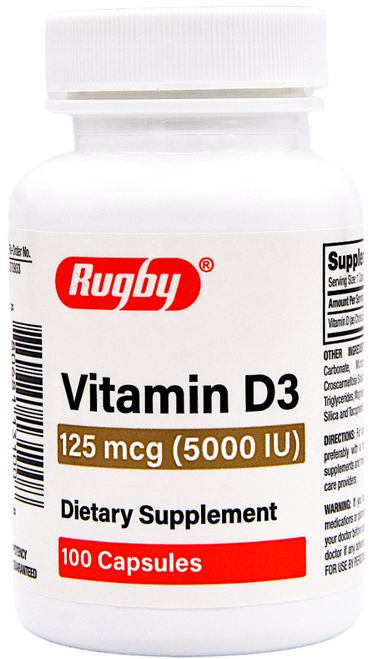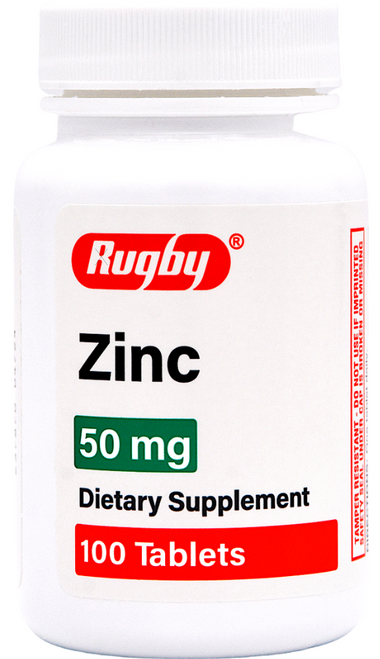Product Overview
Boost Your D - Rugby Vitamin D3 1000IU
Support bone health, immunity and mood with Rugby Vitamin D3. Delivering 1000 IU of high potency cholecalciferol per tiny, easy-to-swallow tablet, Rugby D3 helps you meet the daily recommended intake. Suitable for vegetarians and free of common allergens, Rugby D3 allows you to reap the wellness benefits of the "sunshine vitamin" without UV exposure. Backed by our painstaking quality standards, Rugby D3 makes it easy to supplement a critical nutrient for overall health.
Expiration Date: 2-2026
Support local business with fast, free delivery in Las Vegas from our Nevada warehouse. Get your order shipped free next-day to your door when you order by 2PM.
Supplement Facts (Amount per tablet)
- Vitamin D (as Cholecalciferol) - 25 mcg (1000 IU), 125%
- Calcium (as Calcium Carbonate) - 25 mg, 2%
Uses
- Bone health - Vitamin D helps the body absorb calcium for strong, dense bones. Rugby D3 supplements can support bone strength.
- Immunity - Vitamin D plays a role in immune cell function. Rugby D3 may help boost immunity.
- Mood support - Research links vitamin D to serotonin activity which affects mood. Rugby D3 may enhance wellbeing.
- Heart health - Vitamin D is associated with cardiovascular function. Rugby D3 can support heart health.
- Muscle function - Vitamin D aids protein synthesis for muscle contraction. Rugby D3 helps maintain muscles.
- Cell growth - Vitamin D supports healthy cell life cycles. Rugby D3 promotes cell development.
- Nutrient absorption - Vitamin D helps the body utilize calcium, magnesium, zinc and other nutrients.
Dosage Form
- Tablets
Count
- 100 Tablets
Free Of
- Yeast
- Wheat
- Gluten
- Milk or milk derivatives
- Lactose
- Artificial color
- Artificial flavor
- Sodium (less than 5 mg per serving)
Dosage and Administration
Adults
- Take one (1) tablet preferably with a meal
Warnings and Precautions
- If you are pregnant, nursing, taking any medications or have any medical condition, consult your doctor before use
- Discontinue use and consult your doctor if any adverse reactions occur
Possible Side Effects
- Hypercalcemia - Excessively high vitamin D intake for long periods can cause too much calcium absorption and lead to hypercalcemia. Stick to recommended daily dose.
- Digestive issues - Taking high amounts of vitamin D may cause nausea, vomiting, diarrhea or other GI upset in some individuals. Reduce dose if this occurs.
- Drowsiness/fatigue - Large doses of vitamin D could result in tiredness, drowsiness or fatigue. Adjust dose as needed for your body.
- Bone/joint pain - Improper vitamin D supplementation may alter calcium and phosphate levels, leading to bone or joint discomfort. Discontinue use if this happens.
- Risks in kidney disease - Individuals with kidney conditions need to use caution with vitamin D, as it can increase calcium levels. Consult a doctor before use.
- Risks in sarcoidosis - Vitamin D can raise calcium levels for those with sarcoidosis. Check with your doctor first.
As with any supplement, consult your healthcare provider before use if you have any medical conditions or concerns.
Other Information
- To preserve quality and freshness, keep bottle tightly closed
- Store in a dry place
- Keep out of reach of children
- Do not use printed seal if under cap is broken or missing
Other Ingredients
- Microcrystalline Cellulose, Starch, Stearic Acid, Croscarmellose Sodium, Sucrose, Acacia, Maltodextrin, Hypromellose, Magnesium Stearate, Sodium Ascorbate, Triglycerides, Silicon Dioxide, Tocopherols and Talc
FAQ
Q: What does Vitamin D3 do?
Rugby Vitamin D3 25 mcg Dietary Supplement - 100 Tablets provide a daily dose of Vitamin D3, which is an essential nutrient that plays many important roles in the body. Vitamin D3 is primarily known for its role in promoting bone health, as it helps the body absorb calcium and phosphorus. It also plays a role in supporting the immune system, muscle function, and cardiovascular health. Additionally, Vitamin D3 is important for regulating mood and may have a positive effect on mental health. Taking Rugby Vitamin D3 25 mcg Dietary Supplement - 100 Tablets on a daily basis may help support overall health and wellbeing, especially for individuals who may not get enough Vitamin D3 through their diet or exposure to sunlight.
Q: How much vitamin d should a person take every day?
The recommended daily intake of vitamin D can vary depending on factors such as age, sex, and overall health. However, a general guideline is for most adults to aim for around 600-800 international units (IU) of vitamin D per day. It is important to note that individual needs may vary, and it is always best to consult with a healthcare professional to determine the appropriate dosage for your specific circumstances.
Q: Can a person take vitamin d3 everyday?
Yes, it is generally safe for a person to take vitamin D3 daily. Vitamin D3 is the preferred and more active form of vitamin D, and it is commonly taken as a daily supplement to maintain adequate levels of this essential nutrient. However, it is recommended to follow the dosage instructions provided by healthcare professionals or the manufacturer's guidelines. It's always a good idea to consult with a healthcare professional before starting any new supplement regimen to ensure it is suitable for your specific needs.
Q: What's difference between vitamin d and vitamin d3?
Vitamin D is something our body needs to stay healthy. There are two types of vitamin D: vitamin D2 and vitamin D3. The main difference between them is where they come from. Vitamin D2 mostly comes from plants, like certain mushrooms and fortified foods. Vitamin D3 is made in our skin when we're out in the sunlight, and it's also found in some animal-based foods like fish and egg yolks.
The important thing to know is that vitamin D3 is better for our bodies because it's easier for us to use. After we absorb vitamin D3, our body changes it into a special form called calcitriol, which helps us keep our bones strong, supports our immune system, and does other important jobs in our body.
Both types of vitamin D can help if we don't have enough, but vitamin D3 is usually the better choice. It's always a good idea to talk to a doctor or healthcare professional to get advice about how much vitamin D we need and what type is best for us.
Q: What are the side effects of taking vitamin D3?
When taken within recommended dosage levels, vitamin D3 supplements are generally considered safe for most people. However, excessive intake of vitamin D3 can lead to potential side effects. Some possible side effects of taking high doses of vitamin D3 include:
1. Nausea and vomiting: Taking too much vitamin D3 can cause digestive discomfort, leading to feelings of nausea and vomiting.
2. Constipation: High doses of vitamin D3 may contribute to constipation or worsen existing constipation symptoms.
3. Fatigue and weakness: In rare cases, excessive vitamin D3 intake can result in fatigue, weakness, or a general feeling of being unwell.
4. Excessive thirst and increased urination: Consuming very high doses of vitamin D3 may cause excessive thirst and increased frequency of urination.
5. Elevated blood calcium levels: Prolonged and excessive vitamin D3 supplementation can lead to high levels of calcium in the blood, a condition known as hypercalcemia. This can cause symptoms such as excessive thirst, frequent urination, abdominal pain, bone pain, and kidney problems.
It is important to note that these side effects are more likely to occur with extremely high doses of vitamin D3, well above the recommended daily intake. To ensure safety, it is recommended to follow the dosage guidelines provided by healthcare professionals or the manufacturer of the supplement.
If you have any concerns about taking vitamin D3 or are experiencing any adverse effects, it is always best to consult with a healthcare professional for personalized advice and guidance.
Q: What are some signs of vitamin d deficiency?
Vitamin D deficiency can manifest in various ways, and it's important to note that the signs and symptoms can vary from person to person. Here are some common signs of vitamin D deficiency:
1. Fatigue and tiredness: Feeling constantly tired or fatigued, even after getting enough rest, can be a sign of vitamin D deficiency.
2. Muscle and bone pain: Vitamin D plays a vital role in maintaining healthy bones and muscles. Deficiency can lead to generalized bone and muscle pain, weak muscles, and increased susceptibility to fractures.
3. Mood changes: Some studies have linked low vitamin D levels to mood disorders such as depression, anxiety, and seasonal affective disorder (SAD).
4. Weak immune system: Vitamin D is crucial for a properly functioning immune system. Deficiency may result in frequent infections, slow wound healing, or an increased susceptibility to illnesses.
5. Hair loss: In some cases, vitamin D deficiency can contribute to hair loss or thinning hair.
6. Impaired wound healing: Vitamin D is essential for the healing of wounds. Insufficient levels of vitamin D may slow down the healing process.
7. Bone loss or osteoporosis: A long-term deficiency in vitamin D can lead to decreased bone density, osteoporosis, and an increased risk of fractures, particularly in older adults.
It's important to note that these symptoms can also be associated with other health conditions, so a proper diagnosis from a healthcare professional is necessary to confirm a vitamin D deficiency. If you suspect you may have a deficiency, it is recommended to consult with a healthcare provider who can order a blood test to measure your vitamin D levels and provide appropriate guidance for supplementation or other treatments.
Q: How does vitamin d3 affect the kidney?
Vitamin D3 is important for our kidneys, which are organs that help clean our blood and make urine. Vitamin D3 helps keep our kidneys healthy and helps control the balance of calcium and phosphorus in our bodies.
One of the jobs of vitamin D3 is to turn into a special form called calcitriol in our kidneys. Calcitriol helps our bodies absorb calcium and phosphorus from the food we eat. It also helps our bodies keep the right amount of calcium in our blood and prevents us from losing too much calcium in our pee.
Sometimes, if a person has problems with their kidneys, they may have trouble converting vitamin D3 into calcitriol. This can cause problems with the balance of calcium and phosphorus in the body. In those cases, doctors might give them a special form of active vitamin D to help fix the balance.
It's important to take the right amount of vitamin D3 and talk to a doctor if you have any kidney problems. They can help you understand how much vitamin D3 you need and if you need any extra help to keep your kidneys healthy.
Remember, while multivitamin supplements can be beneficial, they are not a substitute for a balanced diet and healthy lifestyle. For personalized advice, always consult with a healthcare professional before starting any new supplement regimen.









